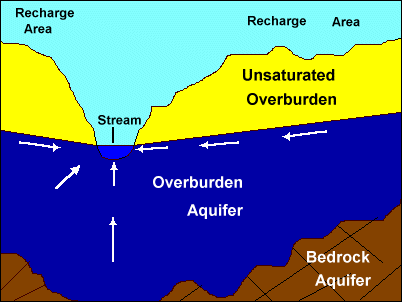

![]()
 Most groundwater originates from rainfall that has entered the earth.
The drawing shows a typical situation with water saturated soils (overburden
aquifer) over a bedrock aquifer. In the overburden aquifer, water fills the
void space between grains of the soil. Bedrock aquifers underlie the surface soils
(overburden) and overburden aquifers. In the bedrock aquifers, water occurs in
fractures and other voids in the bedrock. Some types of bedrock such as
sandstone may also have additional voids (intergranular voids) that are filled with
groundwater.
Most groundwater originates from rainfall that has entered the earth.
The drawing shows a typical situation with water saturated soils (overburden
aquifer) over a bedrock aquifer. In the overburden aquifer, water fills the
void space between grains of the soil. Bedrock aquifers underlie the surface soils
(overburden) and overburden aquifers. In the bedrock aquifers, water occurs in
fractures and other voids in the bedrock. Some types of bedrock such as
sandstone may also have additional voids (intergranular voids) that are filled with
groundwater.
As is the case for surface water, groundwater flows from higher elevations (or pressures) toward lower elevations (or lower pressures). Groundwater flow is usually toward a groundwater discharge area, as shown in the illustration. The stream in the drawing represents a typical groundwater discharge area. Groundwater pressure, rather than elevation, controls the rate and direction of flow in confined (or artesian) aquifers. Those are aquifers that are isolated under impervious or poorly pervious strata (aquicludes and aquitards).
![]()
![]()
![]()
This page hosted by ![]() Get your own Free Home Page
Get your own Free Home Page